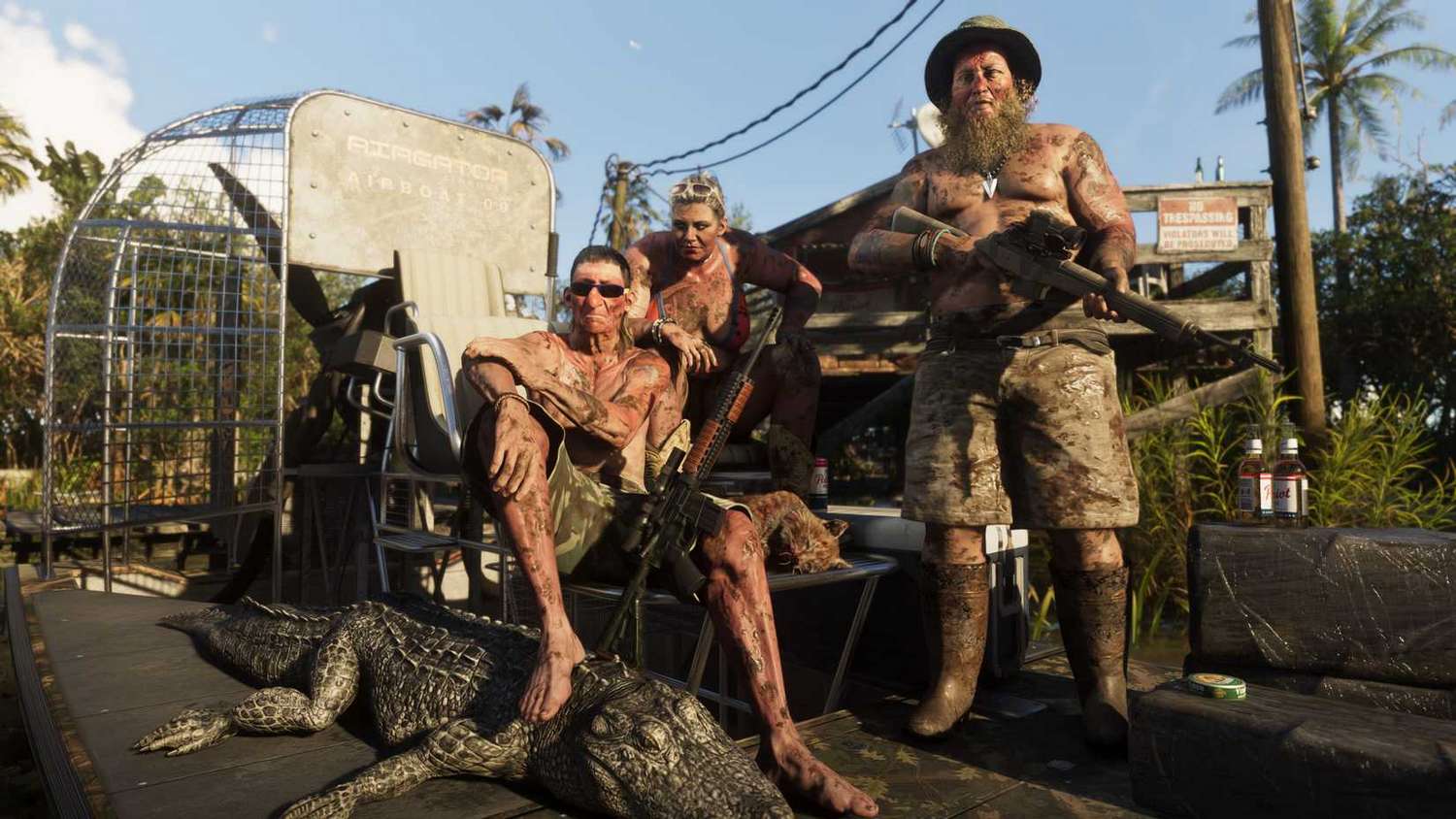GTA 6 Studio Rockstar Games Hit With Union-Busting Allegations Following Mass Staff Terminations
Popular Now
 R.E.P.O
R.E.P.O
 CarX Street
CarX Street
 BeamNG.drive
BeamNG.drive
 Rust
Rust
 Garena Free Fire: Kalahari
Garena Free Fire: Kalahari
 Toca Boca World
Toca Boca World
 Black Myth: Wukong
Black Myth: Wukong
 Fortnite
Fortnite
 Warframe
Warframe
 EA SPORT FC 25
EA SPORT FC 25  The video game development world has been rocked by fresh controversy surrounding Rockstar Games, the titan studio behind the highly anticipated Grand Theft Auto VI (GTA 6). Reports have surfaced indicating that the developer has terminated the employment of approximately 30 to 40 staff members across its UK and Canadian offices. This move, occurring just months before the scheduled GTA 6 release date in May 2026, has ignited a fierce public and legal debate, with a leading union accusing the studio of a “ruthless act of union busting.”
The video game development world has been rocked by fresh controversy surrounding Rockstar Games, the titan studio behind the highly anticipated Grand Theft Auto VI (GTA 6). Reports have surfaced indicating that the developer has terminated the employment of approximately 30 to 40 staff members across its UK and Canadian offices. This move, occurring just months before the scheduled GTA 6 release date in May 2026, has ignited a fierce public and legal debate, with a leading union accusing the studio of a “ruthless act of union busting.”
The news comes amidst a backdrop of escalating gaming industry layoffs throughout 2024 and 2025, which has seen numerous high-profile studios restructure their teams. However, the nature of these specific Rockstar Games firings has raised substantial questions about employee rights and corporate conduct in the high-stakes video game development sector.
The Allegations: Union Activity Versus “Gross Misconduct”
The core of the controversy lies in the starkly opposing reasons cited for the terminations. The Independent Workers’ Union of Great Britain (IWGB), representing game workers in the UK, has leveled a severe accusation against the GTA 6 developer. The union asserts that the dismissed employees were targeted for their involvement in unionisation efforts and were all members of a private trade union chat group. In a public statement, IWGB President Alex Marshall condemned the action, labelling it as “one of the most blatant and ruthless acts of union suppression in the history of the UK games industry.”
The union’s claims paint a picture of deliberate retaliation against workers seeking collective bargaining rights. Furthermore, the IWGB highlighted that some of the dismissed staff were particularly vulnerable, including those on company-sponsored visas—whose employment loss puts their residency status at risk—and those with medical conditions who now face losing access to essential workplace healthcare schemes.
In direct contrast, Take-Two Interactive, the parent company of Rockstar Games, has adamantly denied the union-busting allegations. A spokesperson for Take-Two informed the press that the terminations were exclusively “for gross misconduct, and for no other reason.” The company maintains that its decision is fully supported and a necessary measure, though it has declined to provide specific details regarding the nature of the alleged misconduct.
The timing of the firings, impacting multiple offices simultaneously and involving employees connected to a singular union discussion channel, has led many in the industry to view the company’s “gross misconduct” defense with skepticism. Legal experts anticipate that this conflict may escalate into a significant legal challenge, testing the boundaries of UK employment law concerning trade union activity protections.
 Broader Context: Developer Crunch and the Final Push for GTA 6
Broader Context: Developer Crunch and the Final Push for GTA 6
This internal friction at Rockstar Games must be viewed through the lens of the intense development cycle for GTA 6. The sequel to one of the most profitable entertainment products of all time, GTA V, carries an almost unimaginable weight of expectation. Earlier this year, the company mandated a full-time return to the office, citing reasons of “productivity and security” as the game entered its final stages of development.
The move away from flexible work conditions, which had been criticized by the IWGB at the time, was largely interpreted as a measure to prevent leaks—following a massive data breach in 2022—and to ensure maximal efficiency during the crucial period often referred to as “developer crunch.” Historically, Rockstar Games has faced heavy scrutiny over its demanding workplace culture, which has included past reports of excessive overtime during the production of its major titles. The simultaneous timing of a strict return-to-office policy and these subsequent mass firings suggests a company prioritizing tight control and expedited production timelines above all else, potentially at the expense of employee morale and workplace rights.
The affected employees reportedly included crucial roles, such as Quality Assurance (QA) testers and support staff—teams that are integral for identifying bugs and ensuring a polished final product, especially in the final months of a game’s lifecycle. Disruptions to these departments could potentially impact the quality and delivery schedule of the game. Industry analysts have already been tracking Take-Two Interactive stock closely, as any significant perceived delay or internal turmoil at Rockstar could affect its market valuation, given the immense revenue expectations tied to the GTA 6 launch.
What It Means for the Future of GTA 6 and Game Labor
The ongoing dispute shines a harsh light on the growing tensions between game developers seeking better working conditions and large publishers aiming for maximum profit margins and control over their intellectual property. The IWGB has pledged to pursue legal recourse, including seeking reinstatement and interim relief for the affected members. This commitment signals a protracted battle that could set a vital precedent for labor relations across the entire global gaming industry.
For players eagerly awaiting GTA 6, the controversy introduces an unsettling element to the game’s narrative. While the product itself is likely to be a commercial success and a technological masterpiece, the ethical debate surrounding its creation will inevitably linger. The situation underscores the often-unseen human cost behind the development of AAA video games.
Ultimately, the resolution of this case will be crucial. If the union’s claims are validated, it will solidify the argument for stronger labor organization within the video game industry. If Take-Two’s “gross misconduct” defense prevails, it will reinforce a corporate stance against organized labor activities. In either scenario, the legal and public fallout will significantly influence how future high-profile game releases—and the developers who create them—are viewed by consumers and industry stakeholders.
 Key Review Points of GTA 6 in Development
Key Review Points of GTA 6 in Development
While the internal turmoil is significant, the overarching review of GTA 6’s development remains one of massive scale and ambition. The game is confirmed to be set in a modern-day version of Vice City and the surrounding areas, a fan-favorite locale. Confirmed details, despite the leaks, suggest:
- Protagonists: The first confirmed playable female protagonist in the series, Lucia, alongside her male counterpart, Jason, in a narrative structure inspired by the criminal duo Bonnie and Clyde.
- Open-World Scope: The map is expected to be substantially larger and denser than previous iterations, leveraging the latest iteration of the Rockstar Advanced Game Engine (RAGE) for unparalleled visual fidelity and environmental complexity.
- Online Mode: A significant focus remains on an evolving, dynamic Grand Theft Auto Online experience, which is a major revenue stream for Take-Two Interactive.
The stakes for the game’s quality and its developers’ working conditions remain intrinsically linked as the May 2026 launch date looms. The world is watching to see if the final product justifies the cost—both financial and human—of its creation.









 Broader Context: Developer Crunch and the Final Push for GTA 6
Broader Context: Developer Crunch and the Final Push for GTA 6 Key Review Points of GTA 6 in Development
Key Review Points of GTA 6 in Development